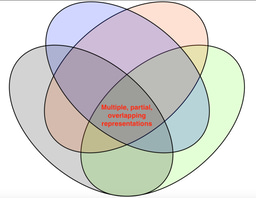The multidisciplinary gardener
Published in Neuroscience

We all need to be multidisciplinary these days. University students are confidently told by their tutors that the future lies away from narrow specialisation; the true twenty-first century student will be able to traverse the arbitrary boundaries of specific subject categories with ease. This is all fine, but our enthusiasm for the polymathic can, I worry, have some serious dangers in a world where even achieving specialisation in one discipline is so challenging.
The application of psychology and neuroscience findings to education seems in many ways an archetypal example of such a modern multidisciplinary project, one to which increasing numbers of teachers and researchers are contributing. This interest is naturally welcome, given that I am a firm believer in the potential gains for education of taking a more scientifically informed approach to learning. However, the increasing numbers of academic researchers looking to make connections between their work and educational practice does raise some concerns about what it truly means to be ‘multidisciplinary’ in such a new and expanding field. Specifically, I would suggest that the following maxim would be a useful one for both researchers considering their own results, and also teachers looking to evaluate the potential contribution of research to their practice:
Multi-disciplinarity doesn’t mean simply applying from your discipline into another one
Whilst this is an issue that has niggled at me for some time, the straw which broke the camel’s back this week was reading ‘The Gardener and the Carpenter’ by developmental psychologist Alison Gopnik. The book is an attempt to show why developmental psychology evidence demonstrates that the modern fashion for 'parenting' (the 'carpenter' of the title, in which parents desperately try to shape their child into a particular pre-defined adult form), is misguided. I really wanted to like the book, and given that I can't stand 'how to' parenting books, and find developmental psychology fascinating, I thought I would be onto a pretty sure thing. And in parts I did enjoy it. The parts describing the developmental psychology research were superb; delightfully, almost whimsically, creative experiments which produce fascinating results. Gopnik is a world-leading expert in the development of young children's (e.g. under 7 or so) reasoning skills and I read these sections with the confidence and excitement that comes from receiving a guided tour from a true specialist. It would have been a much shorter book had it stopped there, but I would have been a happier reader.
The basic message of the evidence presented is that young children are remarkably adept and efficient at learning from the adults around them, but also from their environment. This combination allows them to both absorb the wisdom and traditions of previous generations, but also to make new discoveries themselves. Too much of one of these two strands can be detrimental to the other; too much didactic adult instruction can impede natural curiosity and discovery. So far so good, for experiments on children who are mostly of pre-school age or just above.
Unfortunately, Gopnik cannot resist extrapolating the findings of these studies into suggestions for educational policy. Not just primary schools, but even secondary schools, would apparently benefit from a redesign to allow learning to occur in a more observational manner, with greater emphasis on learning by ‘apprenticeship’, where children develop ‘mastery’ from extended interactions with experts. Inquiry and discovery learning should therefore replace a school system which only teaches children ‘to learn how to go to school’ and ‘become experts at test-taking’. Is there evidence to support these conjectures? Does Gopnik have the same level of experience in the field of educational design as in developmental reasoning? Certainly, the continual references to studies dry up entirely in these sections. Instead, statements such as,
“Many of the most effective teachers, even in modern schools, use elements of apprenticeship. Ironically, these teachers are more likely to be found in the ‘extracurricular’ classes than in the required ones. The stern but beloved baseball coach or the demanding but passionate music teacher let children learn this way”
seem to suggest that her evidence is gathered mainly from film plots. In actual fact, such ‘minimal guidance’ instruction has been found to be generally much less effective as a form of instruction, unless the students are already knowledgeable about a topic.
Gopnik is undoubtedly a multidisciplinary figure (she also writes philosophy papers), but I’m not sure that the educational system is one of those disciplines. As a philosopher, she will presumably be aware of Hume’s distinction that what ‘is’ does not imply what ‘ought’. The fact that children do have a great ability (sometimes better than adults) to learn through their own experimentation and interaction with the world, doesn’t imply that they ought to always do this to acquire their knowledge. Let’s say, for the sake of argument, that her ‘apprenticeship and inquiry’ model of education was the most effective one available. Even in this case, a range of other factors also govern judgements of ‘value’ in education, such as the time taken, resources, teacher capacity, motivation and many others1. All these need to be weighed into the mix as well. As Dylan William has written, “Big effects may not be worth pursuing if they cost too much to secure. And very small effects may be important if they are inexpensive to implement.” Goodness knows how much it would cost in terms of hiring and training new teachers if we are to redesign schools around a small group apprenticeship model. We’d need to be unbelievably confident that it was the right thing to do. As we saw above, however, there is good reason not even to think that it is the most effective way to learn in many situations.
In terms of crimes against multidisciplinarity, I do not by any means think that Gopnik is alone (or even the worst offender). Indeed I have noted before that I am often uncomfortable with many so-called ‘Educational Neuroscience’ studies being used to make unwarranted and premature applications to the classroom. To me, the role of educational neuroscience is not at all about the creation of new sparkly teaching methods, but too often this seems to be the aim (off the back of a few brain scans). Multidisciplinarity offers potentially huge benefits to learning and education, but in order to reap those rewards, and to avoid cul-de-sacs and wasted effort, we must be as confident as we can be that our ideas will stand up to scrutiny in the new field. We must all ensure that, as researchers, we understand enough about the discipline we are applying into to be able to objectively evaluate our ideas (or to work with others who can). If we don’t, then we aren’t really being multidisciplinary, and we probably aren’t making progress.
References:
Kirschner, P. A., Sweller, J., & Clark, R. E. (2006). Why Minimal Guidance During Instruction Does Not Work: An Analysis of the Failure of Constructivist, Discovery, Problem-Based, Experiential, and Inquiry-Based Teaching. Educational Psychologist 41 (2): 75, 41(2), 75–86. Retrieved from http://scholar.google.com/scholar?hl=en&btnG=Search&q=intitle:Work+:+An+Analysis+of+the+Failure+of+Constructivist+,+Discovery+,+Problem-Based+,+Experiential+,+and+Inquiry-Based+Teaching#8
Footnotes:
- Incidentally, the is-ought distinction is also one that I think is useful for explaining why the issue of the role of genetics in learning (as ably summarised on this site by Annie Brookman-Byrne recently) should not be as controversial as it often is. The (unarguable) fact that genetics does play a role in academic learning does nothing to imply anything normative about how people should be treated as a result of this.
Follow the Topic
Your space to connect: The Psychedelics Hub
A new Communities’ space to connect, collaborate, and explore research on Psychotherapy, Clinical Psychology, and Neuroscience!
Continue reading announcement



Please sign in or register for FREE
If you are a registered user on Research Communities by Springer Nature, please sign in
Education is an applied science. It applies the pure sciences of cognitive psychology and neuroscience. Just as students in the applied science of engineering need to study physics and chemistry, education students need to take several semesters of neuroscience. Starting with a semester of neuroanatomy to master the vocabulary. That is the only way the education professional of today will be ready for the discoveries of tomorrow.
The key to "traversing the boundaries of specific subject categories" is to be an independent learner. The primary function of schools should be to ensure students leave school as independent learners, capable and willing to apply the science of learning (https://www.coursera.org/learn/learning-how-to-learn) .
Hi Jay,
Thanks for your comment. I would certainly agree that teacher training courses would benefit from a much greater focus on the cognitive psychology of learning. Learning could be made much more efficient if applied memory principles such as spacing, interleaving and the testing effect were used as standard practice. I also agree that students themselves should be explicitly taught these techniques. Many students reach university level and beyond whilst still complaining tat they don't really feel that they understand how to effectively learn.
I'm less convinced about the value of neuroscience to everyday pedagogy, given our current level of understanding (though I do think there are exceptions, e.g. https://npjscilearncommunity.nature.com/users/33200-mike-hobbiss/posts/16652-liking-vs-wanting-a-neuroscientific-view-on-classroom-motivation). At present I think that there are very few neuroscientific findings that demonstrate clear implications for teaching practice. For example, imagine finding reduced activity in a particular brain area in a dyslexic child when reading. This doesn't actually tell us anything about what to do about this. Should we find alternative strategies that require different brain structures or intensively train this deficient skill? The finding doesn't help us choose between these opposing responses.
Of course, as we learn more (and test predictions more in school environments), we may be more able to generalise from neuroscience to the classroom with confidence.
Hello Mike,
I presume you haven't looked at the MOOC - Learning How to Learn - that I linked to. The course demonstrates the value of neuroscience to everyday learning. It's free to enroll, and while written at a high-school level, the additional readings for each week includes substantial scholarly work. Oakley is a polymath and Tejnowski is a computational neuroscientist. It is the the world's most popular MOOC for good reason.
Thank you for the link to your post on liking versus wanting. I fully agree that the issue of human motivation is crucial issue in the science of learning. The MOOC explores motivation in some depth , from a very practical perspective. You may be interested in this 2012 New Scientist cover story. It discusses research funded by the US military on training recruits by enabling Flow through transcranial direct current stimulation and EEGs for biofeedback (http://www.advancedbrainmonitoring.com/wp-content/uploads/downloads/2013/03/Zen-and-the-Art-of-Genius.pdf).
I do believe the human sciences are maturing to the point that they are capable of delivering scientific revolutions comparable to the industrial revolutions. I propose in this conference paper that the science of learning is now mature enough that it should be taught in schools to ensure that all school graduates are independent learners ( http://www.seaairweb.info/conference/2017Proceedings.pdf#page=241). Enabling a world of life-long learners would generate the first of these revolutions.